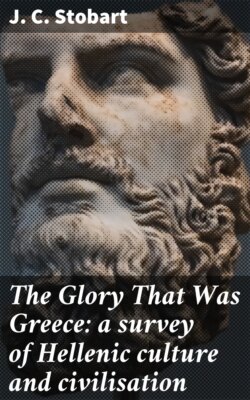Читать книгу The Glory That Was Greece: a survey of Hellenic culture and civilisation - J. C. Stobart - Страница 9
На сайте Литреса книга снята с продажи.
A New Chapter of History
ОглавлениеTable of Contents
T is the misfortune of historians to be liable to attacks at both extremities. On the one hand time is continually adding postscripts to their “Finis,” and on the other hand the archæologist is constantly making them tear up and rewrite their first chapters. In Greek history especially the spade has proved mightier than the pen. We are now only certain that the first page of any Greek history written ten years ago must be defective; we are not yet quite sure what to put in its place. Any moment, it seems, the explorer may turn up something which will make a difference of a thousand years or so in our earliest chronology. There are in the Cretan museum scores of clay tablets inscribed with an unknown writing which only await an interpreter to confound and illuminate us all. Forty years ago eminent writers like Gladstone and Freeman were still looking to Homer for their ideas of the primitive European and his civilisation. Strange indeed were the results that followed. In politics we were to believe that the earliest Greeks settled their affairs at a public meeting where elders and princes made persuasive speeches, and radicalism, though not unknown, was sternly discouraged. A benevolent monarchy, hereditary in the male line, was supposed by Sir Henry Maine to be the form of government common to primitive Europe and modern England. Literature was believed to have begun with elaborate epic poems written in hexameters of exquisite variety and extreme subtlety. The primitive woman was believed to have been the object of chivalrous and romantic esteem. Strangest of all, religion in this primitive world was held to have included the cheerful bantering of anthropomorphic gods and goddesses. We were to suppose that the European began by laughing at his gods and ended by worshipping them.
Tablet of Cretan Linear Script, from Cnossos
Then in the seventies came the redoubtable Dr. Schliemann, most erudite of sappers, and dug into the hill at Hissarlik to see if he could find the bones of Hector and the ruins of Troy. Troy he found in abundance, five Troys, at least, one on the top of another. He called the second from the bottom the city of Priam, and then he crossed over with his spades and picks to look for what might be left of Agamemnon at Mycenæ. Sure enough, he presently startled the learned world by a telegram to the King of Greece saying that he had found the tomb of Agamemnon. Quite certainly he had found some very important things—things, as we shall soon see, far more interesting and valuable to history than if they had belonged, as Schliemann thought, to the King of all the Greeks. But the point is that for many years to come all the excavators who worked on Greek soil started with the false belief that Homer was the beginning of all things and that their discoveries were illustrating Homer. We now know that the excavations at Mycenæ and the poems of Homer represent two entirely different civilisations, neither of them primitive. We are now in a position to throw the beginnings of European culture in the Mediterranean basin centuries—nay, whole millenniums—farther back than our fathers’ wildest dreams could carry them. The history of European civilisation is no longer a traceable progression from Homer to Tennyson or from Odysseus to Captain Peary, but a long cycle of rising and decaying cultures with periods of darkness intervening. For this revolution in our ideas the responsible weapon is the humble but veracious spade.
